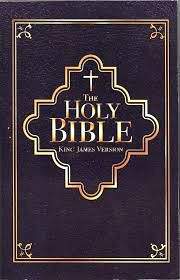Influences or Contributions of the English Bible to English
Influences or Contributions of the English Bible to English
Influences or Contributions of the English Bible to English
(Influences or Contributions of the English Bible to English): English is a gluttonous language and it engrosses every linguistic element that comes into its contact. It did not fall back to take elements from the English translation of the Bible. The influence of the Bible began to fall on English in the thirteenth century through the Latin version of the Bible and through the translations done by John Wycliffe and Martin Luther. But this influence was neither bright nor strong nor permanent. The regular and even more strong and noteworthy influence of the Bible began to fall on English from the seventeenth century onwards with the English translation of the Bible. Before the English Bible, there was not a systematic and unanimous common Bible for all. So to fill up the lack of a uniform Bible a conference was convened at Hampton Court by King James I of England and a proposal was taken to translate the Bible into English. As an effect, forty-seven eminent divines and scholars began the task and after hard labour for three years and a half, the Authorized English version of the Bible appeared in 1611 under the seal of the authority of the King of England. The translations of the Bible followed the original Hebrew text as well as the translation of Tyndale and Coverdale and that of John Wycliffe. When the English Bible appeared it became the hand and guidebook of the English people and since then its influence on the English language began to fall spontaneously. Even great writers of the English language like Shakespeare, Milton, Pope, Tennyson, Wordsworth, Emerson, Keats and many others were influenced by the English Bible. The influence of the English Bible on the English language was multifold as the thematic influence, stylistic influence and linguistic influences. Thematically John Bunyan’s Pilgrim’s Progress, Milton’s Paradise Lost, Paradise Regained, Simon Agonistes etc. were greatly influenced by the themes of the Bible. Influences or Contributions of the English Bible to English
The first linguistic influence of the Bible may be called the influence of its striking phrases. For example: tell it not in Gath, wash one’s hand of a still small voice, take up his parable etc.
The Bible influenced English similes and metaphors also, such as: clear as crystal, arose as one man, transparent as the sky, etc.
The English language received many compound expressions such as- tender- hearted, loving- kindness, long- suffering, peace- makers etc.
There are many Biblical phrases that have assumed the character of English idioms, as: to caste pearl before swine, the eleventh hour, the shadow of death, a howling wilderness, a labour of death etc.
English has got many figurative nouns from the Bible as: olive branches (means children) helpmate (means partner).
The new forms of superlatives have been to English due to the influence of the English Bible. As for example– holy of holies, in my heart of hearts, the place of all places, the study of studies, the modern of moderns etc.
Many oblivious and obsolete words have been revived and preserved in the passage of the Bible for future speakers, such words are: apparel (for ‘dress’), raiment (for ‘clothes’), damsel (for ‘young woman’), travail (for ‘labour’) etc. Had these words not been preserved in the Bible probably they would have been lost from our everyday vocabulary by now.
Due to the influence of the Bible, many striking phrases have been invented with a conscious allusion to Biblical incidents, as: the Benjamin of the family, the shibboleth of a party, the worship mammon, a Leviathan ship etc.
Besides these influences, the Bible influences the sentence structure of the English language which is very near to poetic reading. For example-
(a) Every lad has a friend of friends, a crony of cronies, whom he cherishes in his heart of hearts.
(b) The evil of evils in our present politics.
(c)The woman is a horror of horrors,
(d) Love like yours is the pearl of pearls, and he who wins it is the prince of princes.
(e) I am sorrowful to my tail’s tail etc.
Many Biblical proper names have been used as appellatives, such as: Jezebel, Rahab, Jehu etc.
The Bible affected even the language and style of English poetry, such as:
Nature and Nature’s law lay hid in night. God said, let Newton be and there was light.
The above-quoted pair of lines is written in the style of the Bible. Where we read: God said, let there be light and there was light.
Thus the Bible contributed many new elements to English which have made the English language more figurative, poetic, alliterative and rhymed. 0 0 0
Influences or Contributions of the English Bible to English
Influences or Contributions of the English Bible to English
Read More: Latin Influences on English
Influences or Contributions of the English Bible to English
N. B. This article entitled ‘Influences or Contributions of the English Bible to English’ originally belongs to the book ‘A Brief History of the English Language‘ by Menonim Menonimus. Influences or Contributions of the English Bible to English
Books of Linguistics by M. Menonimus:
- A Brief History of the English Language
- Essays on Linguistics
- My Imageries
- Felicitous Expression: Some Examples
- Learners’ English Dictionary
Related Searches:
- Contributions of the King James Bible to the English Langugae
- Influences of the Bible to English Language
- French Influences on English Language
- Greek Influences on English Language
- The Latin and Greek Influences on English Language
- The Influence of Old Norse on English
- Scandinavian Influences on English Language
- Latin Influences on English Language
- 10 Characteristics of Human Language
- 10 Main Features of Human Language
- Characteristics of Language
- The English Language: Some Characteristics
- Influences of the Norman Conquest on English











